- Home
- Pam Weaver
Love Walked Right In Page 26
Love Walked Right In Read online
Page 26
Her tummy muscles tightened and Ruby felt something come away from her. She looked under the sheet and discovered she had passed a sticky, jelly-like plug of mucus. Was this the ‘show’ that her mother had told her about? This discovery was followed by some more muscular spasms and an increased level of pain. She laid her hand on her tummy and felt it get harder and then relax. Each pain lasted about half a minute.
How she wished Jim was in the bed beside her. But perhaps, she told herself sadly, that wouldn’t have been such a good idea after all. Although he’d spared her blushes, the baby wasn’t his. Oh, Jim . . . I miss you. In no time at all, her emotions were all over the place. Her labour had started and she didn’t want to think any more. Tears trickled down her cheeks and onto the pillow and she cried. She cried for poor Jim, she cried for the baby and she cried for herself. For as long as she could remember she had longed to be a mother, but now she didn’t even want this baby. How could she spend a lifetime looking after someone who reminded her of her own infidelity and betrayal? How could she cope with running the guest house and looking after a baby? She would tell everyone that she wanted it adopted. They’d understand. They’d say, ‘Poor girl, she doesn’t want a constant reminder of her dead husband.’
She heard a movement on the other side of the door in the corridor. Imogen was on her way to the bathroom. She would give her a chance to have a wash and get dressed and then she’d call her.
Ruby’s next pain was subsiding when the memory of Jim’s bloated face stole across her mind. She shuddered at the thought of that horrible stuff coming out of his eyes, and the egg-shaped swelling on his temple. Her eyes suddenly grew wide again. Yes, the coroner was right: Jim did have a bump on his head. How could she have forgotten? And, more to the point, how did it get there? They had said at the inquest that he must have bumped himself against the side of the oven as he climbed in. She had already established in her own mind that there was no way Jim could have got into the oven on his own. But suppose he had that injury before the gas taps were switched on? He could have been hit with something, to knock him out first.
She took in her breath noisily. That bruise – Jim must have been hit with the electric iron! She distinctly remembered putting it in the grate as she left the house with her mother. And yet when Bea was getting rid of the shepherd’s pie, there the iron was, in the middle of Jim’s wheelchair. She shivered. Someone must have picked it up out of the grate and hit Jim on the head, before putting him in the gas oven.
Now she was absolutely positive that Jim had been murdered . . . but why?
May stared crossly at the ceiling. It had been a chaotic morning, and now her favourite time of day was being spoiled.
Her sister had arrived at the house just after ten. She appeared to be ill. Her stepfather helped Ruby upstairs and she was moaning with pain.
‘What’s wrong?’ May had asked, but her mother waved her away.
‘Nothing for you to worry about. Run along and play, there’s a dear.’
May hated it when she was fobbed off like that, but if she made too much of a fuss the grown-ups sent her to her room and she had to keep the door shut. If she didn’t make a fuss, she could gather her things in the dining room and keep the door open. That way she would be able to see anything exciting.
There was a lot of activity in the house, but it wasn’t very interesting. A nurse in a blue uniform and a starched white apron arrived, and Mummy took her upstairs. Mrs Dixon, their daily, arrived shortly afterwards, even though she didn’t usually come on a Sunday.
A bit later on, Mummy and Daddy came downstairs and sat in the garden room. Mrs Dixon made them some coffee.
‘She’s a fine healthy young woman,’ May heard Mrs Dixon say. ‘I’m sure there’s no cause for concern, madam.’
May followed her back out to the kitchen, ostensibly to get a drink for herself.
Mrs Dixon handed her a glass of home-made lemonade. ‘Now be a good girl, won’t you, May? Don’t get in people’s way. Your mother and father have got quite enough to worry about.’
May was about to ask her how the nurse would get Ruby’s baby out of her tummy when she was shooed out of the kitchen.
Back in the dining room, she decided that a chair facing the door would give her the best option to find out what was going on. She could keep an eye on the stairs while she sat at the table with her colouring pencils. The nurse didn’t come back down, but her stepfather went up and down twice more, and each time Mummy waited anxiously at the bottom of the stairs until he came back.
‘Mummy . . .’ May tried once.
But Bea said, ‘Not now, dear’, before May even had the chance to say anything. Adults could be very annoying sometimes. May knew she couldn’t make too much fuss about it, because she had only just signed the League of Ovaltineys’ seven promises.
Number one was to do the things parents tell you. When she’d committed herself to that promise, she had no idea it would be so infuriating. The other promises weren’t so bad. Number two was to have plenty of exercise; number three was to work hard at school; number four was . . . what was number four? Oh yes, to make sure she had a good sound sleep; number five was to eat everything her mother said; number six was to drink Ovaltine every day; finally, number seven was to be a loyal member of the League of Ovaltineys. It had taken her ages to persuade her parents to let her join the league, so it was important not to disobey the rules. Being a real Ovaltiney gave her the right to wear the badge, have a certificate of merit, the rulebook and, best of all, a copy of the secret code.
Mrs Dixon called her into the kitchen for dinner and May was surprised to find two slices of cheese on toast waiting for her. Normally on Sunday they had a lovely roast dinner, with lamb or beef and crispy roast potatoes and lashings of gravy.
As she tucked in, she tried to coerce Mrs Dixon into telling her what was going on, but her probing questions went unanswered. ‘Ask your mummy,’ she replied. Or ‘Your daddy will explain it all, I’m sure.’
What was the big secret? Had something gone wrong and they couldn’t get the baby out? Why wouldn’t anyone tell her? May finished her cheese on toast and went outside with her apple. There was no one around to take her to Sunday school, so she decided she would miss it this week. She didn’t care that much and besides, she didn’t want to miss the strange goings-on in her house.
She mooched around moodily and wished she was more grown-up. For heaven’s sake, she was nearly eleven. Surely that was old enough to be told the truth? Halfway through the afternoon, May heard her sister scream. She rushed back indoors, her heart going like the clappers. Was Ruby going to die? What were they doing upstairs? When she burst into the sitting room, her mother was sitting there as calm as you like – knitting! What sort of a mother leaves her child by herself, screaming?
Ruby cried out again. May waited for some sort of reaction. ‘Aren’t you going to help her, Mummy?’
Her mother looked up and smiled. ‘Everything’s fine, darling. Don’t worry.’
May was flabbergasted. A couple of seconds later her stepfather came back downstairs, rolling down his sleeves. Mummy looked up at him and moved to the edge of her chair. Now, at last! thought May.
‘A while to go yet,’ said Daddy, and Mummy settled back down again.
‘May, ask Mrs Dixon for some tea, will you, dear,’ said Mummy, hardly looking up from her knitting.
Having delivered the message, May sat at the kitchen table. Another wail of anguish made its way into the room. ‘Is my sister going to die?’ she whispered.
‘Heavens, no!’ cried Mrs Dixon. ‘She’s having her baby, that’s all.’
She bustled out of the kitchen with the tea tray, leaving May blinking with rage. Well, of course she was going to have a baby! Did Mrs Dixon think she was stupid or something? Ruby cried out again, and May shivered. If having a baby meant all that pain and all this fuss, one thing was absolutely certain: she would never ever have one.
CHAPTER 29
<
br /> The crunch came at around five o’clock. May needed the radio on for 5.30 p.m., when the Ovaltineys would be on Radio Luxembourg, but she wasn’t supposed to touch the knobs by herself. By now everyone else in the house was running about like headless chickens, or was on the telephone or something. Nobody was listening to her. Mrs Dixon had prepared a meal, laid the dining-room table and then gone home. Both Mummy and Daddy were upstairs now, and Ruby was still yelling the place down. When, to May’s immense relief, Auntie Rachel turned up, May begged her to switch on the radio. As soon as she’d done so, May curled up on the sofa and asked her aunt to join her, but Auntie Rachel bounded upstairs too.
Oh well – now at last she could enjoy something sensible. There were songs: ‘We are the Ovaltineys’, of course, ‘Happy days are here again’ and ‘Such funny little ways’, a nonsense song that made her laugh. And there were jokes: ‘Question: Why do you have fouls in football? Answer: Because they have ducks in cricket.’ She didn’t quite understand that one, but the children on the radio laughed, so she did too.
At times it was difficult to hear, with Ruby making such an awful racket, but she did manage to copy down the numbers for the secret-code message, just before her mother burst into the room. As soon as the door opened, May was aware of a baby’s cry. Her mother was beaming from ear to ear, as she put her arms round her youngest daughter and hugged her tight.
‘Oh, May, Ruby has had her baby. She has a darling little boy. You’re an auntie now.’
Rested and clean, Ruby relaxed against the pillows. The nurse was tending to the baby and her mother had come into the room with a cup of tea. The baby had a lusty cry and already Ruby was feeling a tug at her heartstrings. While she was in labour she had made up her mind not to look at him, but when the nurse held him upside down and slapped his bottom to encourage him to cry, the urge was too strong.
Ruby and her mother exchanged a loving smile as she sipped the scalding tea. The nurse appeared at her side with a small bundle that looked like an elongated sausage. Bea took the cup from her and, when the nurse leaned over the bed, Ruby automatically crooked her arm to receive him. She looked down at a cherubic face, not wrinkled at all. Bea stroked his dark hair, and he screwed up his eyes and pulled the corners of his mouth down ready to cry.
‘Hello, sweetheart,’ Ruby whispered near his ear, and he stopped, as if hearing her voice for the first time.
He wasn’t exactly handsome, but Ruby’s heart was immediately lost. Everything in her body wanted to love and protect this little boy. The rush of feeling was almost overwhelming.
‘Oh, darling,’ Bea was saying, ‘I can hardly believe it. He’s beautiful.’
Yes, yes, he was. And he was her son, her precious little boy.
‘We’ll put Baby back in his cot now,’ said the nurse, cutting in. She was a solidly built woman, the brusque and no-nonsense type, but Ruby had felt perfectly safe in her capable hands. ‘He needs a rest after his ordeal.’ She took him back and Ruby watched her place him in the bottom drawer of the chest of drawers, which they had emptied out and put across two chairs. His makeshift bed would have to do until she got him home to Sea View and his own cot in her bedroom.
The pain and anguish of the past few hours were forgotten as Ruby relaxed against the pillows again. Her father had been with her, and the nurse never left her side throughout the birth. At the very end, Rex had actually delivered his first grandchild himself. Having made sure his daughter was doing well, he was now downstairs drinking a much-needed whisky and trying to remove the ear-to-ear grin that wouldn’t go away. Most unprofessional, he told himself.
‘What are you going to call him?’ May had crept into the room and was staring down at the baby.
‘Michael,’ said Ruby. ‘Michael James Searle.’
In the days that followed, Ruby had a steady stream of visitors and every time she showed them her son, her heart was filled to overflowing with love. She and Michael bonded well and he fed from her breast greedily. Somehow Michael’s arrival had helped to soothe her feelings of loss. It would have been much better, of course, if Jim had been here with her, but one look at the baby lifted the terrible ache in her heart and made the days more bearable. Ruby really enjoyed all the attention they both received, but it made her feel uncomfortable when people said things like, ‘He looks so like his father’ or ‘Jim would have been thrilled’. If only she could erase Bob Knight from the picture altogether. If only Michael really was Jim’s son.
Imogen turned up, bearing gifts. Ruby was in the sitting room with the window open, getting a bit of fresh air. She tore at the paper and unwrapped a beautiful hand-knitted pure-white shawl and a blue romper suit. ‘I had the shawl made,’ Imogen said, ‘but I bought the romper suit in Hubbard’s. If you don’t like it, they’ll take it back.’
‘Oh no,’ cried Ruby. ‘It’s lovely. Would you like to hold him?’
While Imogen cuddled the baby awkwardly, Ruby said, ‘I want to ask you something. Would you be his godmother?’
Imogen’s eyes grew wide. ‘Oh, Ruby, it would be an honour.’
‘I’ve asked Percy and Rachel,’ said Ruby, fingering the pattern on the shawl. ‘I was going to ask Lena as well, but under the circumstances . . .’ Her voice trailed away.
‘Yes,’ said Imogen, giving an anxious glance over her shoulder, ‘what are you going to do about that?’
‘I don’t know,’ said Ruby. ‘I need to go through Jim’s papers more thoroughly first. I hardly had time to digest them previously.’
‘If that little girl has been taken from her rightful mother,’ said Imogen stoutly, ‘you mustn’t wait, Ruby. It’s wrong.’
‘I know,’ said Ruby, ‘but I’m sure she’s safe and she’s happy. Lena is a good mother.’
‘But she may not be Jean’s mother,’ Imogen reminded her.
‘I know, I know,’ Ruby protested. She was beginning to wish she hadn’t confided in Imogen now. She wasn’t ready to face the enormity of sorting this out just yet, and she didn’t want to feel pressured. Lena, Eric and Jean weren’t the only people she had on her mind. She hadn’t told anybody her suspicions about the knock on Jim’s head being caused by the iron.
‘You have no idea what a woman like that is capable of,’ Imogen said crossly.
‘I’m popping out now,’ said Bea, coming into the room. ‘It’s the Townswomen’s Guild this afternoon. Will you be all right on your own?’
‘I’ll be fine,’ said Ruby, offering Bea her cheek to kiss. ‘Imogen isn’t going just yet, and Edith is coming later on.’
Bea stroked her grandson’s cheek and smiled. ‘What woman were you talking about?’ she asked casually and, seeing their puzzled expressions, added, ‘When I came into the room, you said you didn’t know what she was capable of.’
The two women froze and exchanged anxious glances.
‘The person who knitted this fantastic shawl, of course,’ said Ruby, holding it up for her mother to admire.
Bea enjoyed the newly formed Townswomen’s Guild and, with Rose Wilmot at the helm, it was already expanding. They met in the Oddfellows’ Hall in Clifton Road, so it really did feel like a fresh start. The group organized some wonderful talks on a wide variety of subjects, including district nursing, how to build a rock garden from scratch, and the land of Palestine. Occasionally Mrs Wilmot encouraged the elected officers to step down and let others take over the meeting for an afternoon. This gave ordinary members an insight, as she put it, ‘into the intricacies of administration’. Women who had never been asked to do any more than make the tea suddenly had their first taste of responsibility and leadership.
Not all TWG meetings were self-indulgent. A great many of the activities that both the TWG and the WI took on were for the greater good of others. They campaigned for women police officers, better conditions for domestic servants and better information, should there be a war.
With the precarious situation in Europe in mind, the TWG decided to initiate classes at whic
h experts could show members of the public how to prepare a room in case of a gas attack. To Bea’s mind, Ruby’s place seemed an ideal venue, so she put forward her daughter’s name.
Thus it was that three weeks after Michael came along, about twenty women squeezed into the downstairs reception room at Sea View. The ladies paid for their refreshments and Ruby laid on tea and cake. The police force, who were giving the talk, paid for the use of the room, which not only augmented her income, but also gave Ruby food for thought. By now she had realized that having a small baby in the house required round-the-clock care. How could she look after Michael twenty-four hours a day and run the guest house? Not only that, but he might well disturb her guests at night. It was time to think ahead, and what better way to generate an income than by hiring rooms out for teaching purposes?
With everybody worrying about what was going on across the Channel, it seemed that a plethora of new women’s groups was springing up all over town. She could offer a more intimate setting than a church hall, and she could do the refreshments as well. Not only that, but she could perhaps offer classes herself. They said, if war came, every able-bodied male would be asked to fight. If she rewrote the little booklet she had produced for the German girls, then should war come, it might prove to be useful for ordinary middle-class housewives, who had never so much as lifted a duster. With their domestic servants going to war, they would have to learn how to run their own households.

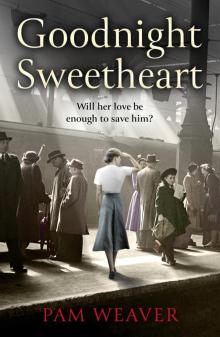 Goodnight Sweetheart
Goodnight Sweetheart At Home by the Sea
At Home by the Sea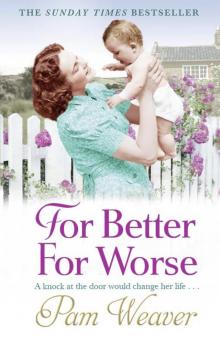 For Better For Worse
For Better For Worse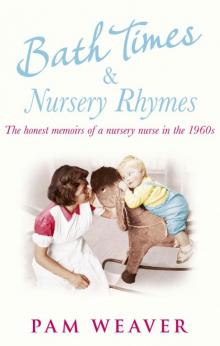 Bath Times and Nursery Rhymes
Bath Times and Nursery Rhymes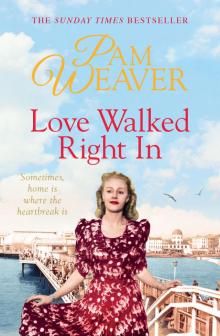 Love Walked Right In
Love Walked Right In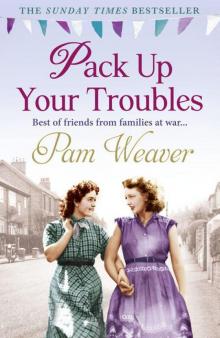 Pack Up Your Troubles
Pack Up Your Troubles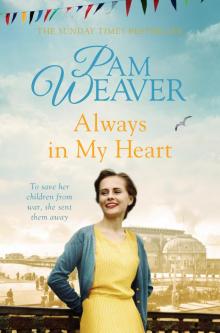 Always in my Heart
Always in my Heart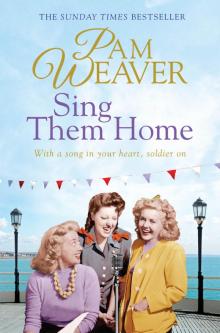 Sing Them Home
Sing Them Home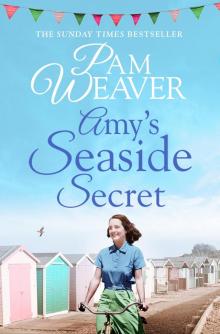 Amy's Seaside Secret
Amy's Seaside Secret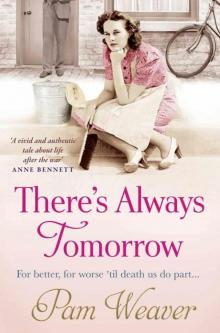 There’s Always Tomorrow
There’s Always Tomorrow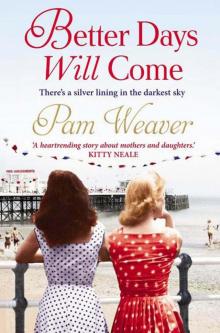 Better Days Will Come
Better Days Will Come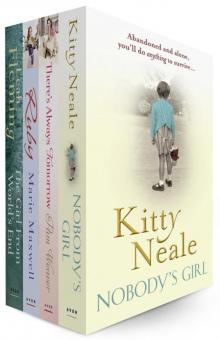 Family Drama 4 E-Book Bundle
Family Drama 4 E-Book Bundle